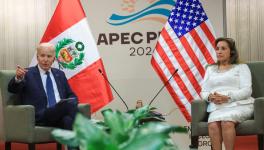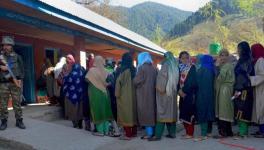China Backs the Opening of Kashmir file in UNSC
Chinese State Councilor and Foreign Minister Wang Yi held talks with Pakistani Foreign Minister Shah Mahmood Qureshi in Beijing, Aug. 9, 2019.
The “special and emergency visit” by Pakistani Foreign Minister Shah Mahmood Qureshi to Beijing on Friday August 9 has been highly successful in getting China to voice open support for Islamabad’s proposed move to raise the Kashmir issue in the UN Security Council.
From both Pakistani and Chinese accounts, the outcome of the meeting between the Chinese State Councilor and Foreign Minister Wang Yi and Qureshi conveys a significant “pro-Pakistan” shift in Beijing’s stance apropos the situation around J&K, which was more or less on neutral ground initially. (See my blog China reacts to J&K, India demands reciprocity.)
How far the reference to China’s “internal affairs” in the MEA spokesman’s remarks on August 6 (which appeared to be a knee-jerk reaction) provoked Beijing is a moot point now. Indeed, Qureshi’s air dash to Beijing signalled Pakistan’s desperate need of Chinese open support and China cannot afford to be seen wanting.
According to the Xinhua report, the cutting edge of Wang’s remarks lies in his listing of the UN Charter (which upholds international peace and security, fundamental human rights, adherence to international law and obligations of member states to adhere to treaties, etc.), relevant resolutions of the UN SC on Kashmir (on the status of J&K, holding of plebiscite, UNMOGIP, etc.) and the bilateral agreements between Pakistan and India (Shimla Agreement and the Lahore Declaration) — in that sequence as the road map on Kashmir.
China has de facto pledged support to Pakistan when the latter raises the Kashmir issue in the UN SC. Wang doubled down on Beijing going the whole hog to support Pakistan: “China and Pakistan are all-weather strategic partners and have always understood and supported each other on issues concerning core interests, which is also a good tradition that both countries should cherish. China will continue to firmly support Pakistan in safeguarding its legitimate rights and uphold fairness for Pakistan in international affairs.”
Qureshi reciprocated subsequently by telling the media in Beijing, “Pakistan is not looking at the military option. We are rather looking at political, diplomatic and legal options to deal with the prevailing situation.” Wang reportedly advised Qureshi that Pakistan should prioritise its national development and peace in South Asia and seek a new path of peaceful co-existence with India.
The Radio Pakistan reported that the Wang-Qureshi meeting lasted for two and half hours, which suggests that substantive discussions took place regarding strategy on Kashmir. The Pakistani report said Wang also agreed that “steps taken by India are unilateral that have changed the status quo and structure” of J&K and “could jeopardize the peace and stability in the region.” It added that Wang “was in concurrence that Jammu and Kashmir has been recognized as a disputed region and its resolution should also be in the light of UN resolutions.”
The overt, dramatic shift in the Chinese stance against Indian interests would have taken into account the ambivalence in the US position on Kashmir. Against the backdrop of the controversial remarks by President Trump to mediate on Kashmir, the US state department spokesperson, when asked on Friday’s press briefing in Washington, blithely passed the buck to the White House.
The spokesperson also underscored, “Obviously, we just had Prime Minister (Imran) Khan here, not just because of Kashmir. That’s certainly an incredibly important issue and something that we follow closely, but we have a host of issues that we work with India on quite closely and that we work with Pakistan on quite closely. I would say that we are – as a State Department, we are incredibly engaged in Southeast Asia.”
During the coming week, two senior US officials are landing in Delhi at the same time — US deputy secretary of state John Sullivan (corresponding to ministerial rank) and Acting deputy secretary of state in charge of South Asia Alice Wells. Sullivan is reaching Delhi from Bhutan while Wells who was on a scheduled visit to Islamabad has extended her tour by travelling to India as well.
By the way, Sullivan becomes the highest ranking US official to visit Bhutan in decades. His visit signals a Churchillian approach in the US policies toward China lately — “We shall fight on the beaches, we shall fight on the landing grounds, we shall fight in the fields and in the streets, we shall fight in the hills.” Historically, this is the first time that Bhutan finds itself being courted as a frontline state in the Cold War cockpit.
Clearly, Sullivan’s visit augurs the same centrality to Bhutan in the US geo-strategy that Washington has lately begun attaching to Mongolia. In June, US National Security Advisor John Bolton visited Ulaanbaatar; in July, President Trump hosted Mongolian President Khaltmaa Battulga in the White House; by August already, the US Defence Secretary Mark Esper touched down in Ulaanbaatar on a daylong follow-up visit “to expand their military training, joint exercises and defense intelligence sharing”, according to Stratfor, US think tank wired into the security and defence establishment.
The big question is, whether Sullivan is delivering an invitation from Trump to the Dragon King of the Kingdom of Bhutan, Jigme Khesar Namgyel Wangchuck.
Equally, there is the likelihood that the US may seek the establishment of intelligence outposts in Bhutan. En route to Mongolia, Def Secy Esper told reporters openly that the US is working to build relationships with key countries in the Indo-Pacific that share values and respect for each other’s sovereignty, “whether it’s Mongolia this trip, Vietnam, a future trip, Indonesia, other countries who I think are key.”
In a reference to China, Esper said, “We’ve got to be able to compete with them.” An AP report quoted a senior US official that the US seeks to expand its defense and intelligence cooperation with Mongolia, noting that its location makes it ideal for listening posts and monitoring stations for peering into both U.S. adversaries.
According to the US state department, Sullivan “will explore expanding and deepening our ties with the government and people of Bhutan.” Of course, any significant expansion of US-Bhutan relations can only happen with the concurrence and approval of India. This is where Chinese sensitivities arise.
Possibly, Beijing senses that Sullivan’s Bhutan trip figured in the meeting between foreign minister S. Jaishankar and his American counterpart Mike Pompeo in Thailand recently. Sullivan is expected to meet Jaishankar.
Most importantly, the state department announcement on Thursday implied that Sullivan’s visits to Thimpu and Delhi are a back-to-back mission with the aim “to advance the United States’ partnership with two nations that are critical to preserving the rules-based order in the Indo-Pacific region.”
To be sure, Beijing would have taken note that the fizz has gone out of the Wuhan Spirit — with just a couple of months left for the visit by Chinese President Xi Jinping to India in October. The Wang-Qureshi meeting testifies to it.
Get the latest reports & analysis with people's perspective on Protests, movements & deep analytical videos, discussions of the current affairs in your Telegram app. Subscribe to NewsClick's Telegram channel & get Real-Time updates on stories, as they get published on our website.
























